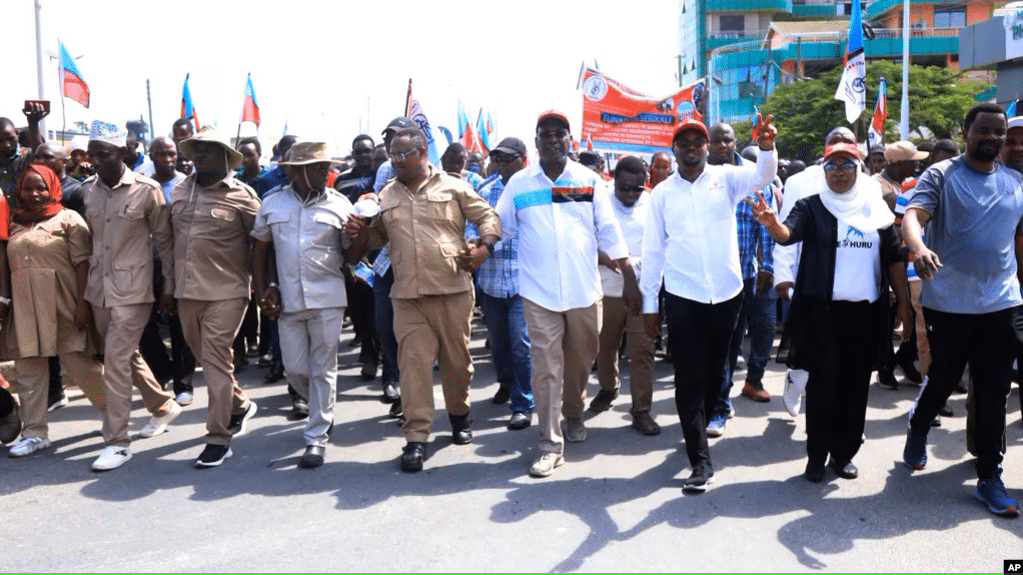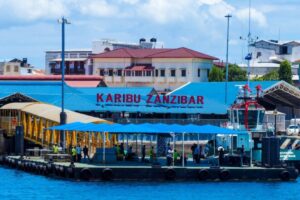

Tanzanian police arrested two opposition leaders again on Monday, their party and police said, to stop anti-government protests in the commercial capital Dar es Salaam.
The main opposition party Chadema’s chairman Freeman Mbowe was detained on the street, while his deputy Tundu Lissu was taken from his home amid plans to demonstrate against alleged killings and abductions of government critics.
Rights campaigners say President Samia Suluhu Hassan’s government is targeting opponents ahead of local elections in December and a national vote in 2025.
Police said 14 people were arrested including Mbowe and Lissu for defying a prohibition on the protests.
There was no immediate comment from Hassan’s government, though it has previously said it defends democracy and does not tolerate brutality.
Chadema said on social media platform X that Mbowe was arrested in the Magomeni area of the city when he arrived to lead a peaceful protest. A convoy of 11 vehicles picked up Lissu and left without saying where he was going, it added.
The pair were also briefly arrested, along with hundreds of supporters, last month.
Lissu survived being shot 16 times during an assassination attempt in 2016.
Earlier this month another senior Chema member was abducted from a bus, his body later found with signs he had been beaten and had acid poured on his face.
Read: Ally Kibao, abducted Tanzanian opposition leader found dead
Original Media Source
Share this news
This Year’s Most Read News Stories

Tanzanian insurance firms upbeat after first quarter business growth
Total gross written premiums for the insurance industry have increased by 13.68 percent in the first quarter of 2024, with small and medium-sized companies showing higher growthContinue Reading

Zanzibar introduces $44 insurance fee for visitors
Visitors travelling to Zanzibar will now have to pay an insurance fee of $44 (about Sh118,360) with effect from September 1.Continue Reading

‘No Marburg Confirmed In Tanzania’, But Mpox Remains ‘Public Health Emergency’

Monrovia — The Director General of the African Centers for Disease Control, Jean Kaseya, has said the center stands ready to support Tanzania and other countries in the region where suspected cases of the infectious Marburg Virus Disease have been identified. The World Health Organization earlier this week issued an alert warning of a possible outbreak in the country, although the Tanzanian Health Ministry has said tests conducted on available samples did not show the existence of Marburg in the East African nation.
“As of the 15 of January 2025, laboratory results from all suspected individuals were negative for Marburg Virus,” Tanzanian Health Minister Jenista Mhagama said in a statement. This would have marked the country’s second experience with the highly infectious disease that recently killed over a dozen people in neighboring Rwanda. Tanzania previously reported an outbreak of Marburg in 2023 in the Kegara region, said to have been the epicenter of the new suspected cases.
At the Africa CDC online briefing on Thursday, Kaseya also said another infectious disease, Mpox, “remains a public health concern”. He said that while in December 2024, the disease had afflicted 20 countries, a new country – Sierra Leone – has been added to the number after recent outbreak there. Sierra Leonean health authorities said on January 10 that two cases of Mpox had been confirmed in the country and dozens of contacts are being traced.
With thousands of confirmed cases of Mpox across Africa and more than 1000 people having died of the disease – mainly in Central Africa – Kaseya emphasized the need to increase testing, a theme he’s heralded before. The Africa CDC boss said over the next few months the continental health watchdog will deploy additional epidemiologists and community health workers to areas considered hot spots of infectious diseases in the region.
Source: allafrica.com










